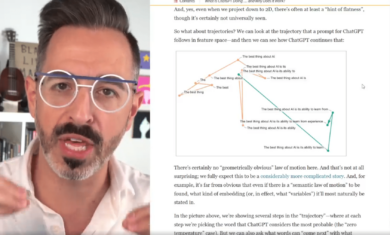In this world where algorithms are increasingly dictating what content we see every day, I’ve been working hard to avoid getting trapped in an echo chamber (as I’ve mentioned before). This recently came up again when Darren Rowse pointed to a 15-year-old post from Chris Pirillo (summarized by Angelo Racoma) that had some amazingly timeless tips in it.
His tips, and my thoughts on how to make them work for you:
Don’t live inside your news aggregator
Funny enough, I really encourage people to use an RSS-based news aggregator, to help avoid the algorithms of social media. I stand by that, but Chris makes a good point that you can create your own echo chamber in there if you’re not careful. Make sure to follow sources you agree with, as well as ones that you don’t, so you can always get a full picture.
Say something original at least once a day
I think I have that covered here, at least fairly well, but I’m working to get a bit more engaged on Twitter, which should help further.
If warranted, quote an “unknown” source
I really like this one. If a quote is valuable, use it. Don’t worry if it wasn’t said by some big name, if there is value then you should be sharing it no matter how “unknown” they might be.
Don’t link to the same site more than once every two weeks
I may be guilty of this one, though I don’t specifically track it. I try to spread my sources around (such as the links to Darren and Angelo today), but I likely return to certain favorites more often than I should.
Wait a week before publishing your thoughts on hot topics
I largely avoid “hot topics”, but this advice is solid. I’ve written before that you should take a minute before giving your thoughts on something fresh, and that’s something I’ll certainly stick to.
Create, don’t regurgitate
This is a tough balance. Much of what I share is someone else’s work (like today’s post) that I unpack a bit and give my input on. Is that creation or regurgitation? I suspect Chris is talking about avoiding just retweeting the click of the day, which I generally try to avoid.
Think twice before using buzzwords
This is something I’ve worked hard toward with our agency, as it’s easy for us to slip into buzzwords with clients, so I try hard not to. It leads me to work to come up with analogies for much of what we do to help with understanding.
Make yourself uncomfortable
This is another one that can be a tough balance. If you’re uncomfortable with something, that might be a good thing, but you also don’t want to be trapped. Get out of your comfort zone, but don’t needlessly do something stupid or annoying.
Stop whining (or worrying) about what list you’re on (or not on)
Given how large the web is now, this is almost a mute point. At least in terms of blogging, I care zero about lists. I still work for some of them for our company (“top business in the city” kinds of things), as those can have tangible advantages, but I generally don’t worry too much about lists.
Stop saying we need to get out of the echo chamber
I disagree with this. I think it’s important to keep this top of mind, because things have gotten so much worse in the 15 years since Chris first wrote this post. I think many of you reading this are in good shape, as simply being aware of the echo chamber is the first step to avoiding it — but most people (particularly on sites like Facebook), aren’t really even aware that it exists and talking about it can help.
It’s impressive that a post of his can hold on so well after 15 years. Any tips that you would add to help avoid the echo chamber?




